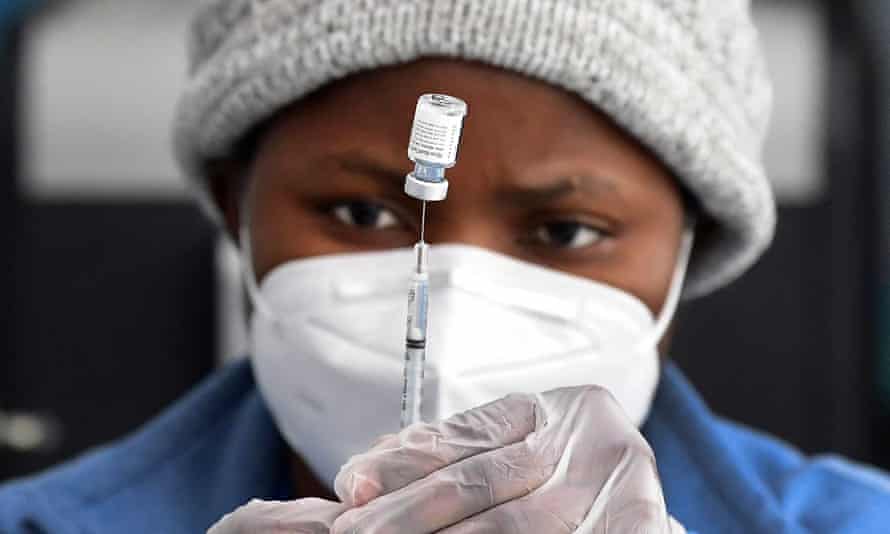Vaccine will generate 73% more than forecast based on contracts signed until mid-April

The US drugmaker Pfizer has smashed its sales forecasts and now expects to bring in $26bn (£19bn) of revenue from its Covid-19 vaccine this year, with its soaraway product accounting for more than a third of the company’s annual income.
The company had expected the vaccine to bring in $15bn over the course of 2021, and the 73% increase in expected revenues to $26bn is still likely to be an underestimate as it counts only orders received by the middle of April and Pfizer is expected to sign more multibillion dollar supply contracts.
The jab, called Comirnaty or BNT162b2, was developed with Germany’s BioNTech, and is priced at $39 for the required two doses in the US and about $30 in the EU. The company said takings from the shot had already generated sales of $3.5bn in the first three months of this year and that the better-than-expected sales would feed through to higher profits.
The new sales estimate is based on contracts signed so far for the delivery of 1.6bn doses globally this year. The firm is already supplying the US, the UK, the EU, Japan and Israel, among other countries, and is reportedly close to signing a contract with Brazil for 100m doses. It has also struck deals with Canada and Israel to supply the jab beyond this year.
The EU recently increased its order to 600m doses for the 27 member states, and expects to boost this further. The European Commission president, Ursula von der Leyen, said last week that the bloc was close to sealing the biggest single deal for a Covid vaccine so far globally, buying up to 1.8bn doses by 2023 – enough to inoculate the 450 million EU population for two years.
The new sales estimate is based on contracts signed so far for the delivery of 1.6bn doses globally this year. The firm is already supplying the US, the UK, the EU, Japan and Israel, among other countries, and is reportedly close to signing a contract with Brazil for 100m doses. It has also struck deals with Canada and Israel to supply the jab beyond this year.
The EU recently increased its order to 600m doses for the 27 member states, and expects to boost this further. The European Commission president, Ursula von der Leyen, said last week that the bloc was close to sealing the biggest single deal for a Covid vaccine so far globally, buying up to 1.8bn doses by 2023 – enough to inoculate the 450 million EU population for two years.
The Pfizer Covid-19 vaccine was the first to be approved by health regulators, and is based on re-engineered messenger RNA – the molecule that sends genetic instructions from DNA to a cell’s protein-making machinery. This means it has to be stored at ultra-low temperatures (-70C or -94F) but Pfizer has applied for regulatory approval to store the vaccine in a fridge for four weeks and is working on a new formulation that could be stored in a fridge for 10 weeks. In March, Pfizer and BioNTech started testing the vaccine in children from six months to 11 years old.
Pfizer’s commercial success contrasts with AstraZeneca, which developed a coronavirus vaccine with Oxford University and is supplying the shot on a not-for-profit basis during the current pandemic. It revealed last week that it lost money on the vaccine in the first quarter, when revenues of $224m were offset by development costs. It charges between $4.30 and $10 for two doses.
Moderna, a loss-making US biotechnology firm, has also gone down the commercial route, similar to Pfizer, charging $30 for two shots in the US and $36 in the EU. Its vast vaccine sales are expected to push the firm into profit for the first time. In February, it estimated revenues from the jab at $18bn this year based on the orders it had then, but said the final number could be higher if it signed more contracts. It will report its first-quarter results on Thursday.
On the back of the vaccine success, Pfizer now expects to generate total revenues of between $71bn and $73bn this year – it also produces drugs to treat diseases including ulcerative colitis, breast and prostate cancer – with the coronavirus jab alone accounting for $26bn of that sum. Adjusted earnings a share are forecast at $3.55 to $3.65.
Pfizer had previously been forecasting total annual revenues of up to $61bn and earnings a share of $3.10 to $3.20.
Even without the vaccine boost, the New York-based company flagged a stronger outlook for revenues, saying its business had performed well overall. It reported total revenues of $14.5bn for the first quarter.
The boost to revenues from the Covid vaccine was partly offset by higher spending on research and development. That rose by 20% in the quarter year-on-year, mainly because of the cost of developing the vaccine and treatments for Covid-19. Pfizer splits costs and profit margins for the vaccine equally with BioNTech.
Albert Bourla, Pfizer’s chief executive, said: “I am extremely proud of the way we have begun 2021, delivering strong financial results in the first quarter. Even excluding the growth provided from BNT162b2, our revenues grew 8% operationally … In addition, we have achieved important clinical, regulatory and commercial milestones across our pipeline and portfolio while also continuing to increase our capacity to supply urgently needed doses of BNT162b2 to the world.”
